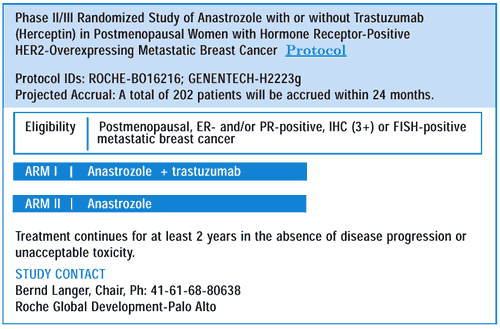|
You
are here: Home: BCU 5|2001: Section 1

SELECTING PATIENTS FOR ENDOCRINE THERAPY
With rare exceptions, I consider hormonal therapy
only for ER/PR- positive patients. We know that patients whose tumors
are truly ER-and PR-poor have very little chance of deriving a clinical
benefit from hormone therapy. However,there is the occasional patient
who has a breast biopsy from many years earlier labeled ER/PR-negative,
yet their clinical history is entirely consistent with hormone-responsive
disease. In that rare patient, I would consider hormone therapy
despite an old report of receptor negativity.
I would think about using hormone therapy in patients with very
low levels of receptors, of course mixing the clinical presentation
into the decision. In a patient with a low degree of receptor positivity,
a long disease-free interval, bone-only metastases and modest symptoms,
I’m going to treat with hormones. In a patient with a low degree
of receptor positivity in visceral crisis, I’m going to use
chemotherapy, although I may consider hormone therapy once they
’ve achieved maximal benefit from chemotherapy.
—Clifford Hudis, MD
PATIENT ASSESSMENT IN THE METASTATIC SETTING
When I approach patients with metastatic breast cancer,
my first concern is palliation. By that, I mean treatment of the
current symptoms as well as prevention of reasonably foreseeable
symptoms.The first question I always ask is, “What ’s
bothering you the most?” My first job is to do something about
that, and then I go on to secondary things. My primary thought always
is: “How am I going to make this patient’s life better
or at least prevent it from getting worse?”
This, of course,immediately leads to the question of how to approach
these patients in terms of treatment. Philosophically, I always
want to use hormone therapy first. Only when I think hormone therapy
no longer offers potential benefit do I move on to systemic chemotherapy
or drugs like Herceptin. Of course,clinical trials are always an
option at any stage.
—Clifford Hudis, MD
ENDOCRINE THERAPY PLUS TRASTUZUMAB
Combinations of trastuzumab and endocrine therapy
need to be looked at in clinical trials of hormone receptor-positive,
HER2- positive patients. We’re participating in a pilot study
just to make sure it is safe. The important thing about these kinds
of trials is that the comparison shouldn’t just be combination
versus single agent, but rather combination versus sequential therapy.
The issue is going to be, “I have used one of the drugs, and
I can move to the other in the event of progression.” Ultimately
we’re going to have to look at these therapies in sequence.
Is there really an advantage to using the two agents together? Is
there some type of synergy, for example, that would give the patient
an advantage over use in a sequential fashion?
—Debu Tripathy, MD

TRASTUZUMAB WITH OR WITHOUT CHEMOTHERAPY
Trastuzumab is clearly one of the major triumphs of
the last few years. It’s exciting on many levels, largely,
of course, because of the clinical benefit, but also because of
the way it opens up a new era of integrating science into the clinic.
My approach is to identify the HER2 status on all of my patients
with metastatic disease. For patients who are HER2-positive —
and by that I mean 3+ by IHC using Hercept test or FISH-positive
— I’m always thinking about the use of trastuzumab.I use
it when hormone therapy is no longer an option. At that point, I
would use it either alone in the patient with relatively indolent
disease or in combination with chemotherapy in the patient who clearly
needs chemotherapy.
Right now, I wish we had randomized data on the question
of trastuzumab plus or minus chemotherapy. We don’t. What we
clearly have are data on trastuzumab as first-line therapy from
a study that Chuck Vogel reported, and we have data on chemotherapy
plus or minus trastuzumab. Discriminating between these two settings
is somewhat challenging. That said, my approach is to look at patients
with Stage 4 disease and ask myself, “Do they need chemotherapy
based on their presentation?” If the answer is yes and they’re
HER2-positive, then I use chemo-trastuzumab. If the answer is no,
maybe they don’t need chemotherapy right now, but if I ’m
out of hormone therapy options, I might use trastuzumab as a single
agent.
—Clifford Hudis, MD
CHOICE OF ENDOCRINE THERAPY
In the past, I was reluctant to use aromatase inhibitors first-line.
But now we have more data. There is an accumulating body of evidence
that the aromatase inhibitors may have some superiority to tamoxifen.
I’m talking to patients now about starting on letrozole or
anastrozole. In Canada we’re on the cusp of making that flip,
but from what I’m hearing, in the United States most people
have moved to aromatase inhibitors first-line.
We’ve been involved in a trial in Canada comparing exemestane
to tamoxifen. But it’s been my question since we started talking
about the trial, whether everyone will flip to using one of the
aromatase inhibitors in first-line and whether this trial may be
outdated or outmoded and not be able to be done.
—Kathleen Pritchard, MD
CHOICE OR AROMATASE INHIBITOR
My read would be that so far as we can see, all three
of the aromatase inhibitors are probably pretty similar. I’ve
not seen something convincing to distinguish them. We’re using
both anastrozole and letrozole. I wouldn’t particularly differentiate.
Sometimes patients come in, having read about one or another and
have a preference, and I just go with it.
The curves for the first-line studies of anastrozole
versus tamoxifen and letrozole versus tamoxifen separate early in
terms of responses and progression-free survival. At the end of
three months, there’s quite a difference between both tamoxifen
and anastrozole and tamoxifen and letrozole.The separation is at
the same place, as though there’s a group of women who are
responsive to each of these aromatase inhibitors who aren’t
responsive to tamoxifen. In both these studies, we’re seeing
a similar phenomenon.
—Kathleen Pritchard, MD
Select Publications
Page
3 of 3
Previous page
|
|
